#gabor maté
Text

#gabor maté#leftistquotes#book quotes#quotes#quoteoftheday#book quote#quotable#life quote#beautiful quote#quote#israel#israhell#benjamin netanyahu#fuck netanyahu#netanyahu a criminal of war#fears of new front in hamas war as hezbollah chief issues chilling threat to israel and netanyahu says ‘don’t test us’#bibi netanyahu#free palestine#freepalastine🇵🇸#palestine#free gaza#gaza strip#gaza genocide#gazaunderattack#gaza#ausgov#politas#auspol#tasgov#taspol
458 notes
·
View notes
Text
[“Especially in infancy, but throughout childhood, the young human uses the emotional and nervous systems of the caring adults to regulate her own internal states. The interpersonal-biological math is elementary: the more stressed the adult, the more stressed the child. Extensive research has demonstrated that when stressed, parents are less patient and more punishing and harsher with their young children. Stress impairs their capacity to be calm, responsive, and attuned.
As a recent review by leading researchers pointed out, “In more stressful environments for parents, children not only experience less protection from environmental stressors but also are more likely to have stress-inducing relationships with caregivers.” Another study showed that, while elevated stress induced more punitive attitudes in mothers, increased levels of support favorably diminished them. Contemporary science affirms ancient wisdom once more.
Parental stress expresses itself in less overt ways, too, such as distraction and emotional absence. Many parents, though loving, are frequently preoccupied by genuine concerns about relationship issues or economic troubles or personal problems and, as a result, just aren’t as attentive or “present.” This affects development as surely as does parental rage or coldness. “Primate experiments show that infants can undergo severe separation reactions even though their mothers are visually, but not psychologically available,” reports the renowned researcher, psychologist, and theorist Allan Schore. Dr. Schore calls such noncontact “proximate separation”—so close, but yet so far. It’s a dynamic that many children in our society experience, owing to the stresses parents habitually endure. The message the child gets is “You are not worthy of my attention. You must work to earn it.”
Whether or not we explicitly recall such experiences, their imprints survive in our unconscious and in our nervous systems. Making matters more stressful is the alienation imposed by financial hardship. “The relentlessness of modern-day parenting has a powerful motivation: economic anxiety,” the New York Times reported in 2018. “For the first time, it’s as likely as not that American children will be less prosperous than their parents. For parents, giving children the best start in life has come to mean doing everything they can to ensure that their children can climb to a higher class, or at least not fall out of the one they were born into.”
The unintended impact of such fearful, status-driven child-rearing is that the child’s irreducible emotional needs fall secondary to the desperation of parents striving to ensure the academic and financial success of their offspring.”]
gabor maté, from the myth of normal: trauma, illness, and healing in a toxic culture, 2022
496 notes
·
View notes
Text

#feeling better#feelings#feel#let yourself feel#quotes#words#wisdom#life lessons#inspirational words#philosophy of life#life quotes#growth#healing#self knowledge#gabor maté#gabor mate
62 notes
·
View notes
Text
The attempt to escape from pain, is what creates more pain.
Dr. Gabor Maté
#gabor maté#quotes#pain#mental health#gabor mate#quote#conciousness#mindfulness#psychology#trauma#anxiety#depression#q
261 notes
·
View notes
Text

418 notes
·
View notes
Quote
So much of what we call abnormality in this culture is actually normal responses to an abnormal culture. The abnormality does not reside in the pathology of the individuals, but in the very culture that drives people into suffering and dysfunction.
Gabor Maté
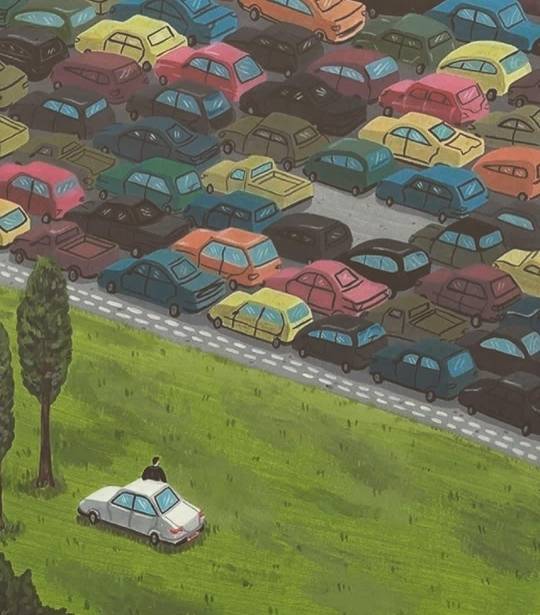
320 notes
·
View notes
Text
You see, the acting-out, the yelling, the screaming and even the hitting, all that a person does, serves as a defence against the experience of the anger. It’s a defence against keeping the anger inside where it can be deeply felt. Discharge defends against anger being actually experienced.
Gabor Maté, When The Body Says No
#Gabor Maté#emotions#feelings#repression#repressing#numbing#anger#rage#yelling#acting out#DBT#dialectical behavior therapy#recovery#healing#personal growth#personal development#When The Body Says No#quotes
111 notes
·
View notes
Photo
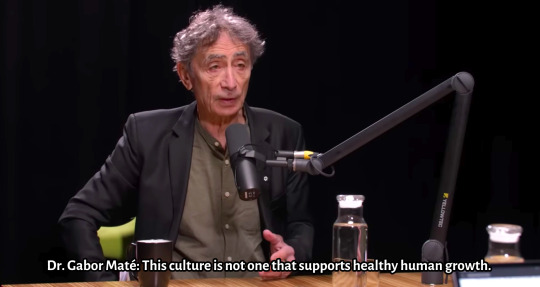
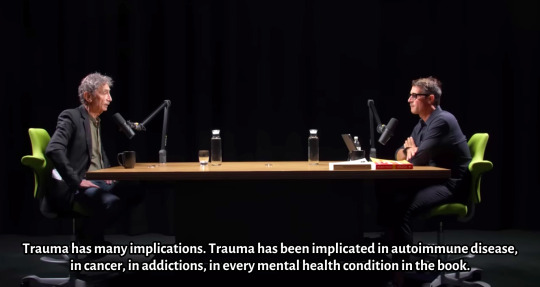

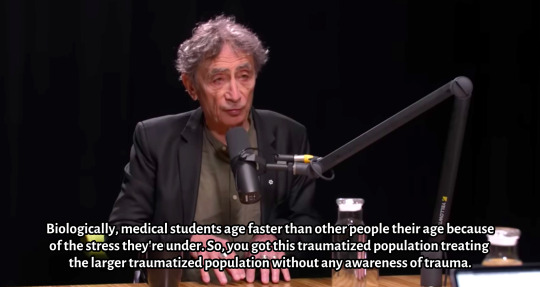
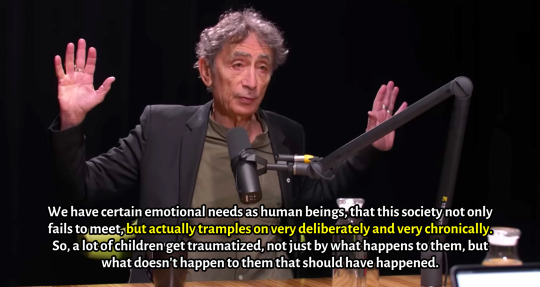
Dr. Gabor Maté On How Trauma Fuels Disease | Rich Roll Podcast
Dr. Gabor Maté: “This culture is not one that supports healthy human growth.
And how social conditions, how inequality of stress, how genderism or racism actually has physiological impacts. They affect our biology. This is not speculation. Trauma has many implications. Trauma has been implicated in autoimmune disease, in cancer, in addictions, in every mental health condition in the book.
But the average medical student does not receive a single lecture on trauma, which is unbelievable, but it’s true. Biologically, medical students age faster than other people their age because of the stress they’re under. So, you got this traumatized population treating the larger traumatized population without any awareness of trauma.
We have certain emotional needs as human beings, that this society not only fails to meet, but actually tramples on very deliberately and very chronically. So, a lot of children get traumatized, not just by what happens to them, but what doesn’t happen to them that should have happened.”
#Dr. Gabor Maté#Gabor Maté#Rich Roll#richrollpodcast#healing#mental health#health#highly recommend#podcast#psychology#biology#science#culture#society#books#quotes#The Myth of Normal: Trauma Illness and Healing in a Toxic Culture
346 notes
·
View notes
Text
“Trauma is not what happens to you. Trauma is what happens inside you, as a result of what happens to you.”
— Dr. Gabor Maté

31 notes
·
View notes
Text
*taps mic* hi hello yes good evening *adjusts mic stand* *takes deep breath* Addiction is always a secondary condition, and if you aren't treating what's underneath it/what led to it/it's source, then you're merely treating the surface symptoms and not the cause. In short, you aren't treating the whole person.
Crowd boos, throws cups, then a voice calls out from the back of the room.
"They're right."
I look to the back of the room at the speaker, now illuminated by spotlight
It's Gabor Maté, M.D.
14 notes
·
View notes
Text
[“Ursula Volz-Boers points out, “Intrauterine life is not a paradise as some people try to make us believe. We are the receiver of all the happiness and of all the anxieties and difficulties of our parents.” But of course, even the earliest factor has its own earlier factors: namely, the intolerable pressures contemporary society places on the rearing milieu, the family, and on the developing young—and, as epigenetics teaches us, on the very activation of DNA itself.
We need to consider to what extent our culture, including employment and the health care and insurance systems, supports or undermines women’s capacity to hold their unborn infants’ needs as a high social priority. How many women are asked during prenatal checkups about their mental and emotional states, what stresses at home or on the job they may be experiencing? How many future physicians are even taught to pose such questions? How many spouses are helped to understand their responsibility to protect their expectant partners from undue stress and travail? How many businesses make provisions for their pregnant employees’ relief? That last question has an especially dismal answer: women frequently report a pregnancy-hostile work milieu, especially in lower-paid jobs. But even in supportive workplaces, women are often burdened by the pressure they have absorbed and put on themselves to perform, advance, even excel in a competence-mad society. Work rarely “stays at work.”
As Rae intuited, the baby feels the mother’s stress directly. “By listening intently to movements and heartbeats, researchers are finding that the fetuses of mothers who are stressed or depressed respond differently from those of emotionally healthy women,” the New York Times reported as far back as 2004. “After birth, studies indicate, these infants have a significantly increased risk of developing learning and behavioral problems and may themselves be more vulnerable to depression or anxiety as they age.” Essential neurotransmitters such as serotonin and dopamine that later play key roles in mood regulation, impulse control, attention, motivation, and the modulation of aggression—and are implicated in the very learning, behavioral, and mood difficulties the article mentions—are affected by prenatal stress on the mother. Babies of moms stressed in pregnancy have lower levels of these brain chemicals and higher levels of the stress hormone cortisol. Not surprisingly, the same study showed that these newborns also had less developed learning skills, they were less responsive to social stimulation, and they were less able to calm themselves when agitated.
Beyond brain substance levels, there is evidence suggesting that maternal mind states during pregnancy and postpartum shape the very structure of the infant’s developing brain. In one study, nursing professor Dr. Nicole Letourneau, Canada research chair in parent-infant mental health at the University of Calgary, and her colleagues found that the child’s gray matter, the cerebral cortex, was thinner on MRI scanning of the brains of preschool children whose mothers had suffered depression in the middle three months of pregnancy. As they point out, their brain-scan findings may presage later problems such as depression, anxiety, impaired impulse control, and attention difficulties in the child.
Postpartum depression had similar effects, indicating that there are certain critical periods in development, both before birth and after, during which the young human is particularly vulnerable to the environment. Such findings align with those of multiple other studies, which point to maternal-stress impacts on such brain structures as, for instance, the fear- and emotion-processing amygdala and on neurological conditions such as autism. Other findings suggest strongly that many adult health challenges—everything from mental health disorders to hypertension, heart disease to diabetes, immune dysfunction to inflammation, and poor glucose metabolism to hormonal imbalance—are made more likely by intrauterine stress. Among researchers there is a “universal consensus,” to cite a major review paper, that what are called the developmental origins of adult disease begin in the womb.”]
gabor maté, from the myth of normal: trauma, illness, and healing in a toxic culture, 2022
#gabor maté#brainspace#currently reading#whatever happened to your grandmother happened to your mother happened to you#(and backwards)
336 notes
·
View notes
Text
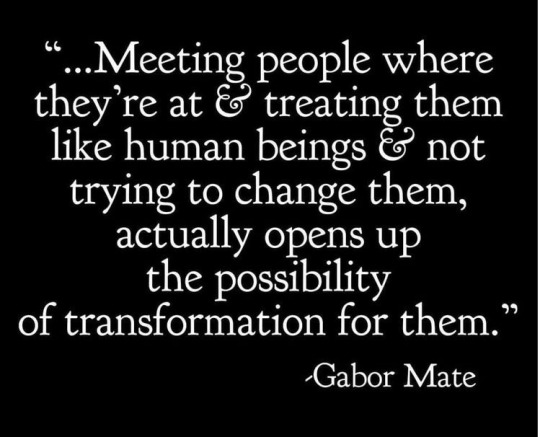
#changing#transformation#quotes#words#life lessons#wisdom#inspirational words#growth#gabor maté#gabor mate#compassion#empathy
160 notes
·
View notes
Text
A thing on disillusionment I came across on Twitter from Gabor Maté (cw: discussion of trauma in context of Canadian residential schools and indigenous oppression), a Holocaust survivor and activist. This is in context of the Israeli-Palestinian situation, but is generally applicable.
It is absolutely dangerous to identify with a thing so strongly you feel personally attacked when the thing is criticized. I see this in big and small ways with fandom, nationalism, religion, all sorts of shit. And the sooner you understand that and start developing enough critical distance to examine those identifications, the better off you and everybody else will be.
#pear text#gabor mate#gabor maté#i hate sounding like an old hippie#with all the 'no side but humanity's side' bullshit#but it is a thing that becomes more true#the older i get
29 notes
·
View notes
Text
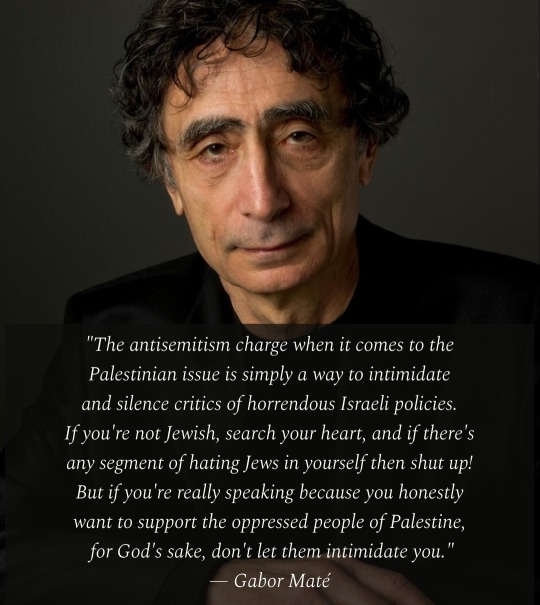
#gabor maté#antisemitism#end israeli apartheid#end israeli occupation#solidarity with palestinians#free palestine
73 notes
·
View notes
Text
"Trauma is not what happens to you but what happens inside you" is how I formulate it. Think of a car accident where someone sustains a concussion: the accident is what happened; the injury is what lasts. Likewise, trauma is a psychic injury, lodged in our nervous system, mind, and body, lasting long past the originating incident(s), triggerable at any moment. It is a constellation of hardships, composed of the wound itself and the residual burdens that our woundedness imposes on our bodies and souls: the unresolved emotions they visit upon us; the coping dynamics they dictate; the tragic or melodramatic or neurotic scripts we unwittingly but inexorably live out; and not least, the toll these take on our bodies.
Dr. Gabor Maté, The Myth of Normal: Trauma, Illness, and Healing in a Toxic Culture.
80 notes
·
View notes
Text

In the Realm of Hungry Ghosts: Close Encounters with Addiction - Gabor Maté
13 notes
·
View notes